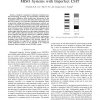Free Online Productivity Tools
i2Speak
i2Symbol
i2OCR
iTex2Img
iWeb2Print
iWeb2Shot
i2Type
iPdf2Split
iPdf2Merge
i2Bopomofo
i2Arabic
i2Style
i2Image
i2PDF
iLatex2Rtf
Sci2ools
101
click to vote
ICC
2007
IEEE
2007
IEEE
Adaptive vs. Diversity Transmission for Multiuser MISO Systems with Imperfect CSIT
Abstract— Adaptive transmission techniques including transmit beamforming, precoding, and opportunistic scheduling offer high spectral efficiency when channel state information at the transmitter (CSIT) is accurate, but suffer performance loss when the CSIT quality is poor. Diversity transmission techniques such as space-time coding and frequency interleaving, in contrast, are capable of capturing spatial and spectral diversity without CSIT, hence can provide good performance when CSIT degradation is severe. Between a pair of adaptive and diversity techniques, there exists a switching point in terms of the CSIT-quality; a CSITquality higher than this point favors the adaptive technique, but a lower CSIT-quality prefers the diversity one. This paper analyzes several adaptive and diversity schemes for a multiuser multipleinput single-output (MISO) system. Comparative performance in terms of the outage capacity is studied and the CSIT-quality switching points between adaptive and diver...
| Added | 02 Jun 2010 |
| Updated | 02 Jun 2010 |
| Type | Conference |
| Year | 2007 |
| Where | ICC |
| Authors | Frederick K. H. Lee, Mai H. Vu, Arogyaswami Paulraj |
Comments (0)

